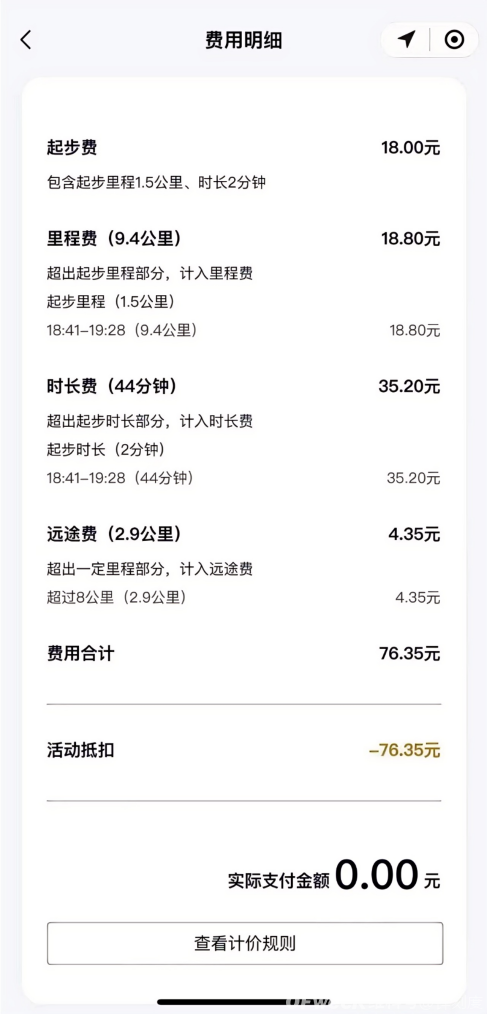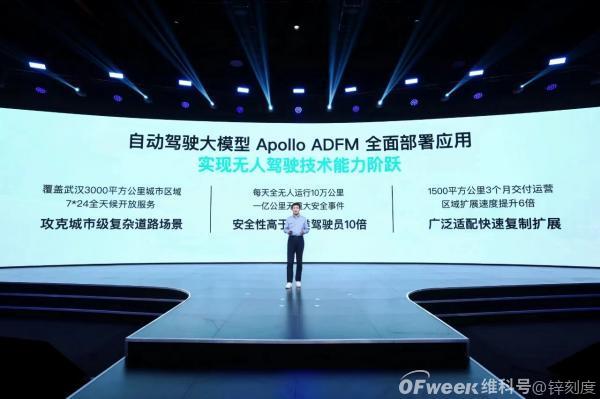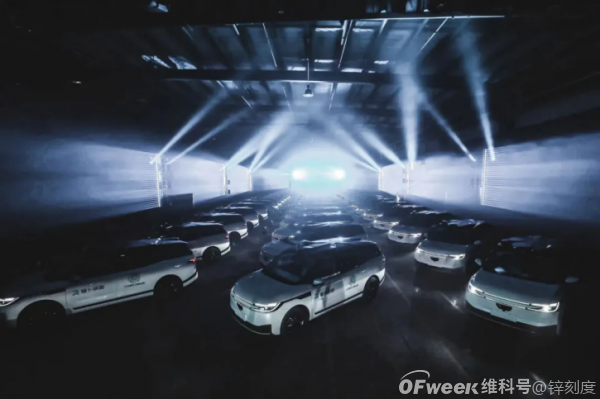Self-driving Taxis Usher in the "ChatGPT" Era
![]() 07/22 2024
07/22 2024
![]() 581
581
The First Winner Emerges
Written by Chen Dengxin
Edited by Li Ji
Typeset by Annalee
The first winner of the self-driving revolution has emerged.
Recently, Luobo Quickrun, which boasts "no order discrimination and no refusal to carry passengers," has become the focus of the internet, while cities such as Beijing and Shanghai have successively announced measures to support urban intelligent travel scenarios.
For a time, Baidu stole the limelight.
Self-driving taxis are not a new phenomenon, so why have they suddenly entered the mainstream public view? There are indeed many players in the self-driving taxi game, so why is it only Baidu that stands out? Will Baidu and Tesla inevitably clash over self-driving taxis?
Luobo Quickrun's Rise is Not Accidental
"It's fantastic! It's like getting a free ride!" said Xie Dong (a pseudonym), an office worker in Shenzhen.
Xie Dong told Znke that the pilot operation of Luobo Quickrun in Shenzhen is limited in scope, and due to courtesies to other vehicles and pedestrians, the actual speed is not fast. However, compared to the discounts, these are not significant issues. "The fare was 76.35 yuan, and the platform subsidized 76.35 yuan. What more could you ask for?"

Xie Dong's Fare on Luobo Quickrun
Therefore, Xie Dong firmly stands by Luobo Quickrun, "The industry impact of self-driving taxis can only be resolved through technological advancements, not by stagnation or even regression."
In a nutshell, self-driving taxis have successfully captured the hearts and minds of consumers.
In this regard, the well-known influencer "Tang Shi Zhuren Sima Qian" commented, "AI application on the ground is like this, it's a trend that won't change whether you sympathize with it or not. Camel Xiangzi, if he were alive today, couldn't pull a rickshaw anymore."
It's worth noting that self-driving taxis have long been praised but not widely adopted, especially after the closure of the unicorn Drive.ai, the industry has been silent for years. There are two reasons behind Luobo Quickrun's rise this time.
On the one hand, vehicle-road collaboration has evolved into vehicle-road-cloud integration.
Vehicle-road collaboration, or "smart cars + intelligent roads," as mentioned in the book "Intelligent Transportation," involves cameras at intersections detecting traffic flow, speed, and other information, feeding it back to the intelligent traffic light system, which automatically adjusts the duration of red and green lights to allow for faster vehicle passage.
From 2024 to 2026, vehicle-road collaboration will evolve into vehicle-road-cloud integration, or "smart cars + intelligent roads + collaborative clouds," thereby enhancing the level and dimension of vehicle autonomy and opening up growth potential for self-driving taxis.
On the other hand, Luobo Quickrun's reach continues to expand.
With the continuous iteration of Baidu's AI and autonomous driving technology, the boundaries of Luobo Quickrun's application scenarios are also expanding and gradually normalizing.
For example, Luobo Quickrun's operational scope in Wuhan has expanded from an initial 13 square kilometers to 3,000 square kilometers, while operating hours have extended from 9 am to 5 pm to 7x24 hours.
Public data shows that in the first quarter of 2024, Luobo Quickrun provided approximately 826,000 services to the public, a year-on-year increase of 25%. As of April 2024, Luobo Quickrun had cumulatively served over 6 million orders.
Self-driving is All About Large Models
In fact, there are many players in the self-driving taxi race, with 28 enterprises participating in validation and exploration alone in Beijing's High-Level Autonomous Driving Demonstration Zone. However, only Baidu has emerged victorious so far.
This is closely related to Baidu's correct choices.
As early as 2013, Baidu established the Institute of Deep Learning and, on this basis, formed an autonomous driving research and development team.
That year, autonomous driving was a hot topic of common interest among global technology companies.
The problem is that while it's easy to foresee an industry's future, perseverance is difficult. Most players simply stake out positions, and few dare to invest heavily.
Baidu's financial report shows that as of the first quarter of 2024, Baidu's cumulative R&D expenses exceeded 150 billion yuan; among them, R&D expenses in the first quarter of 2024 were 5.363 billion yuan, accounting for 17.02% of revenue.
An internet observer told Znke, "Baidu recognized early on that AI could change the game in automobiles. Its investment was significant, and its determination was rare, not to mention its persistence through industry downturns and controversies, which finally paid off with a 'windfall'."
As a result, Baidu's autonomous driving mileage exceeds 100 million kilometers without significant safety incidents, laying a solid foundation for training the Apollo ADFM large model.
Apollo ADFM is the world's first autonomous driving large model capable of supporting L4-level self-driving applications. Through specific multi-modal perception large models, planning large models, and progressively realizing end-to-end reconstruction of the autonomous driving technology stack, it can handle increasingly complex autonomous driving scenarios.
For example, Apollo ADFM can judge the true intentions of approaching vehicles, predicting whether they intend to merge, borrow lanes, or turn right, thereby providing safer and more intelligent decisions.
Another example is the planning large model, which learns from human driving data to simulate actual human driving behaviors, enabling intelligent obstacle avoidance, intelligent game theory, intelligent prediction, and other challenging driving maneuvers.
Xu Baoqiang, General Manager of Baidu's Autonomous Driving Technology Department, stated, "The Apollo ADFM autonomous driving large model operates fully unmanned for 100,000 kilometers per day, with a safety level ten times higher than human drivers. Its system failure rate is comparable to that of the domestically produced C919 large aircraft."

Xu Baoqiang, General Manager of Baidu's Autonomous Driving Technology Department
With the support of Apollo ADFM, Baidu's autonomous driving layout has accelerated, and it now takes only half a year to complete preparations for citywide autonomous driving operations in a new city.
Robin Li, Baidu's founder, chairman, and CEO, said, "The largest application scenario for visual large models is autonomous driving. Baidu is the best in this direction and a global leader in autonomous driving. We not only train AI to generate videos but also train AI to understand what happens in the real world and predict the future."
Foreign Monks May Not Necessarily "Know the Scriptures"
Nonetheless, Baidu cannot afford to slacken, as there is still the variable of Tesla.
Abroad, there are no shortage of powerful technology giants and automotive behemoths interested in self-driving taxis, with Tesla, which has also been deeply involved in autonomous driving for years, being a typical representative.
At the 2024 Tesla Annual Shareholder Meeting, Musk announced the Robotaxi project, stating, "Robotaxi is the ultimate version of Tesla's economical cars, allowing users to profit by renting them out when not in use."
More importantly, there is a possibility that Robotaxi may enter China.
China Daily reported that during Musk's visit to China in April 2024, he proposed wanting to land self-driving taxis in China or receive support for demonstration tests.
If the rumors are confirmed, Baidu and Tesla will compete on the same stage.
Even so, Baidu is unafraid. China's urban design is more complex, and traffic conditions are more variable, giving Baidu a home field advantage. The Apollo ADFM large model understands China's local road conditions better, and it will take Tesla a considerable amount of time to catch up with Baidu.
For example, competing for road rights on the road is commonplace, and mainstream autonomous driving systems have been optimized accordingly. However, since some drivers are aware of the courtesy principles of self-driving taxis, they may make high-risk maneuvers such as malicious lane changes or deliberate obstruction, requiring additional stress resistance and adaptability considerations from the autonomous driving system.
More crucially, Luobo Quickrun has seen the dawn of profitability.
The cost of Luobo Quickrun's fifth-generation model is 480,000 yuan, while the latest sixth-generation model costs 204,600 yuan. Coupled with operational optimizations, it is gradually approaching the breakeven point.

The official unveiling of Luobo Quickrun's sixth-generation self-driving car
Chen Zhuo, General Manager of Baidu's Autonomous Driving Business Department, stated, "Our goal is for Luobo Quickrun to achieve break-even in Wuhan by the end of 2024 and enter a comprehensive profitability period in 2025. Luobo Quickrun will become the world's first autonomous driving mobility service platform to achieve commercial profitability."
Baidu's leading edge is evident.
In summary, Baidu has consistently walked the right path in AI and never wavered, and with the empowerment of the Apollo ADFM large model, Luobo Quickrun has become a key lever for Baidu's large-scale AI commercialization.
Thus, the future of Baidu AI is promising.








